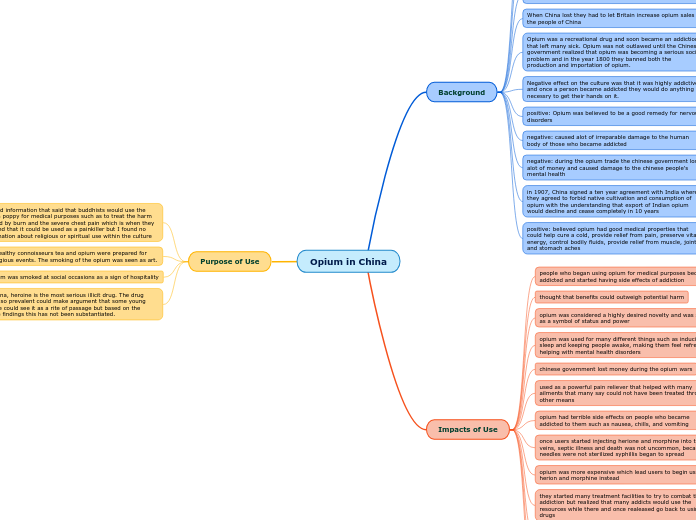Opium in China
Background
British traders were the primary source of the drug in China
The second Opium War was the result of the desire of Great Britain and France to win additional commercial priveleges in China, including the legalization of opium trade, as well as to gain more legal and territorial concessions in China
The first Opium War was fought from 1839 to 1942 between China and Great Britain
The second Opium War was from 1856 to 1860 between a weakened China against Great Britain and France
When China lost they had to let Britain increase opium sales to the people of China
Opium was a recreational drug and soon became an addiction that left many sick. Opium was not outlawed until the Chinese government realized that opium was becoming a serious social problem and in the year 1800 they banned both the production and importation of opium.
In 1813 they outlawed the smoking of opium and imposed a punishment of beating offenders 100 times
In response, Chinese smugglers began buying opium from British and American boats where dealers had to compete so they lowered their prices which made the drug cheaper thus increasing addiction and use
in 1860 when China lost the second Opium War they were forced to legalize opium again and start mass producing it
Negative effect on the culture was that it was highly addictive and once a person became addicted they would do anything necessry to get their hands on it.
addiction became widesoread in China
positive: Opium was believed to be a good remedy for nervous disorders
negative: caused alot of irreparable damage to the human body of those who became addicted
negative: during the opium trade the chinese government lost alot of money and caused damage to the chinese people's mental health
in 1907, China signed a ten year agreement with India where they agreed to forbid native cultivation and consumption of opium with the understanding that export of Indian opium would decline and cease completely in 10 years
positive: believed opium had good medical properties that could help cure a cold, provide relief from pain, preserve vital energy, control bodily fluids, provide relief from muscle, joint, and stomach aches
Impacts of Use
people who began using opium for medical purposes became addicted and started having side effects of addiction
thought that benefits could outweigh potential harm
opium was considered a highly desired novelty and was seen as a symbol of status and power
opium was used for many different things such as inducing sleep and keeping people awake, making them feel refreshed, helping with mental health disorders
chinese government lost money during the opium wars
used as a powerful pain reliever that helped with many ailments that many say could not have been treated through other means
opium had terrible side effects on people who became addicted to them such as nausea, chills, and vomiting
once users started injecting herione and morphine into their veins, septic illness and death was not uncommon, because needles were not sterilized syphillis began to spread
opium was more expensive which lead users to begin using herion and morphine instead
they started many treatment facilities to try to combat the addiction but realized that many addicts would use the resources while there and once realeased go back to using drugs
opium was smoked at social occasions and gatherings as a sign of hospitality
for wealthy people opium would be served with tea at prestigious events
opium was seen as an affiliation of social status among the wealthy
Purpose of Use
I found information that said that buddhists would use the opium poppy for medical purposes such as to treat the harm caused by burn and the severe chest pain which is when they realized that it could be used as a painkiller but I found no information about religious or spiritual use within the culture
the buddhists use was frequent but they attributed all opium poppy use to the medical properties that they had rather than spiritual or religious practices
For wealthy connoisseurs tea and opium were prepared for prestigious events. The smoking of the opium was seen as art.
opium was smoked at social occasions as a sign of hospitality
In China, heroine is the most serious illicit drug. The drug being so prevalent could make argument that some young people could see it as a rite of passage but based on the article findings this has not been substantiated.
